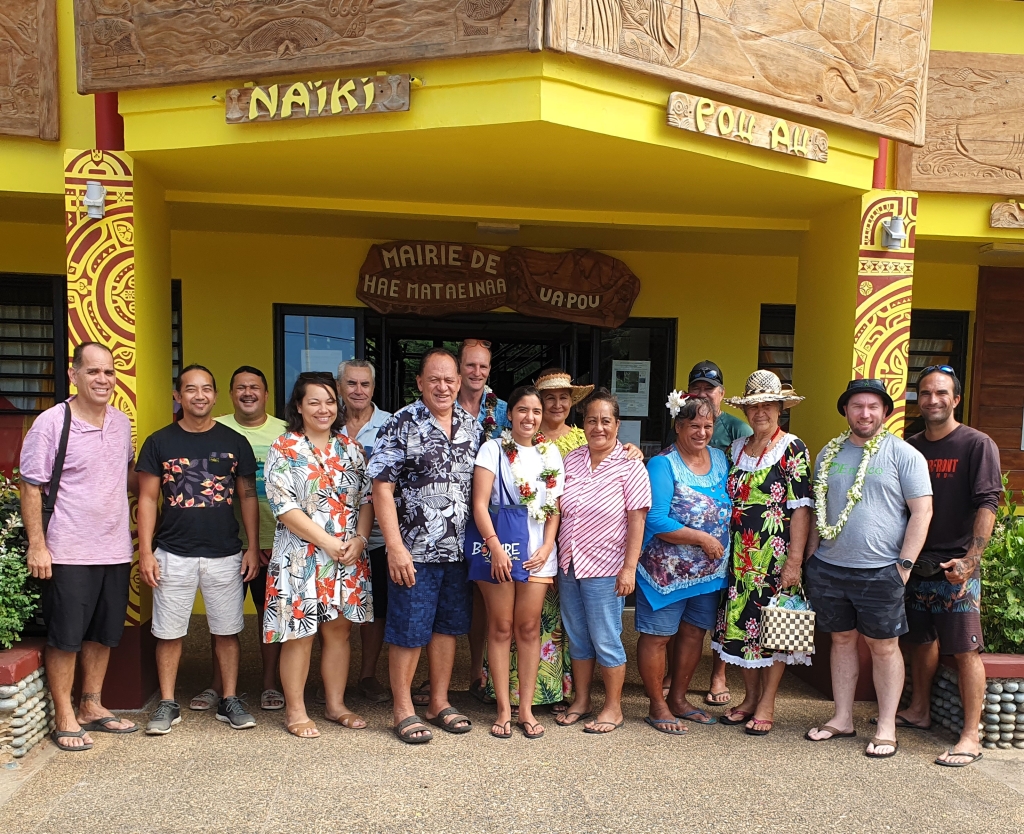
30 September 2024, Ua Pou, French Polynesia: - Following eradication efforts implemented in 2023, a monitoring mission has confirmed that the three islets of Ua Pou, in French Polynesia, are now rat-free. This achievement will provide a safe haven for native and endangered seabirds to nest, restoring balance to the Marquesan coastal ecosystem.
For 15 days, Ms. Tehani Withers and Mr. Roberto Luta from the Société d'Ornithologie de Polynésie (SOP) Manu, a local ornithology NGO, inspected the islets of Motu Takaē, Motu Ōa, and Motu Mokohe, where their traps and night cameras found no evidence of rats.
Although it’s too early to fully assess the benefits, Ms. Withers reported positive initial observations for native bird populations. “At night, we observed numerous Baillon’s shearwaters returning to their burrows, a species previously heavily impacted by rats, especially their eggs and juveniles.
“We also spotted a small population of grey-backed terns on Mokohe, which is encouraging as this species is quite rare. It’s great that the project succeeded here because the island shelters this rare species.”
The successful rat removal is expected to help native and endemic seabirds, invertebrates, and plants recover. This could particularly benefit the 14 seabird species recently recorded on the islets and create suitable conditions for the return of two endangered petrel species last seen in 1995. Seabirds are especially vulnerable to rats, which prey on nests and severely reduce breeding success.
Healthy seabird populations are crucial for marine ecosystems. Recent research has shown that rat removal on islands significantly improves inshore marine biodiversity, linked to increased nutrient inputs from recovering seabird populations. This also provides for more resilient coral reefs which can rebound faster following bleaching events and other disturbances.

“For the Marquesan population fishing around these sites, rat eradication will lead to a more sustainable food resource over time,” commented Ms. Withers.
Positive impacts are also expected for native plants, particularly creeping plants whose flowers and seeds were quickly eaten by rats. As these plants regrow, they should create better habitats for the islands’ fauna, increasing the numbers of terrestrial crabs and insects.
This process seems to have already started, as Ms. Withers noted, “Creeping plants had flowers and seeds, and I also found a lot more insects than usual.”
The project represents a significant breakthrough, overcoming technical challenges and providing valuable experience for future projects in the Marquesas and other Pacific islands with similar topography. Due to the remoteness and steep terrain of the islets, rodenticide was applied using a drone operated from a boat in the open sea.
Before settling on the drone, several other options were considered, including locally operated helicopters and micro-copters.
The ship-based drone operation was the only feasible solution, requiring baiting expertise and managing significant delivery and relocation costs. Despite being the best option, it was challenging to find a vessel capable of maintaining a stable platform in the rough seas off Ua Pou.
To ensure the long-term success and prevent rats from returning to the islets, biosecurity measures have been developed in collaboration with local fishermen. This project implemented by PRISMSS Predator Free Pacific partner, BirdLife International, with support from SOP MANU was made possible by the European Union-funded PROTEGE project.
Managed by the Secretariat of the Pacific Regional Environment Programme (SPREP) through its invasive species programme since 2019, the invasive species component of PROTEGE has funded projects to enhance the resilience of Pacific territories by preserving the biodiversity and associated ecosystem services.
SPREP’s Invasive Species Adviser, Mr David Moverley commented that “witnessing the recovery of biodiversity, ecosystems and the security of cultural values is something we hope is experienced across the Pacific region”.
“By working with PRISMSS partners, local organisations and communities to manage invasive species such as rats we increase the likelihood that the region is prepared to adapt to change such as those brought about by the changing climate”.
The project contributes to a larger effort to protect the biodiversity of the Marquesas archipelago, in line with the rodent removal projects already completed and yet to come on other islets over the next few years.
This plays a part in the preservation of the environmental integrity of the Marquesas, classified in July 2024 as part of UNESCO World Heritage list based on both its cultural and natural values.
PROTEGE
The Oceanian Regional Project of Territories for the Sustainable Management of Ecosystems (PROTEGE) is an initiative that aims to promote sustainable and climate-resilient economic development in the European Overseas Countries and Territories of the Pacific (OCT), based on biodiversity and renewable natural resources and divided into four components, which are Agriculture and forestry, coastal fisheries and aquaculture, water and invasive species.
PROTEGE is a regional cooperation project that supports the public policies of the four Pacific OCTs: New Caledonia, French Polynesia, Wallis and Futuna and the Pitcairn Islands aiming to reduce the vulnerability of human and natural systems to the impacts of climate change by increasing adaptation capacity and resilience. It also aims to improve management, conservation and sustainable resource use of biological diversity and water resources. It is funded by the 11th European Development Fund (EDF) for a 4-year period. The PROTEGE project is being implemented jointly by the Pacific Community (SPC) and SPREP.
SPREP, through the Pacific Regional Invasive Species Management Support Service (PRISMSS), is leading implementation of the invasive species component.
For further information please contact Mr Louis Thiercelin, Project Manager on louist@sprep.org or Mr Nitish Narayan, PRISMSS Communications & Liaison Officer on nitishn@sprep.org